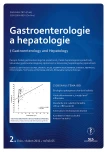Recommended procedure for small bowel examination in patients with Crohn’s disease
Authors:
Luděk Hrdlička
Authors‘ workplace:
Klinické a výzkumné centrum pro střevní záněty, ISCARE Lighthouse a 1. LF UK Praha
Published in:
Gastroent Hepatol 2011; 65(2): 65-69
Category:
IBD: Review Article
Overview
Crohn’s disease (CD) is a chronic, transmural and granulomatous inflammation of the small and (or) large bowel, which often leads to severe structural damage to the digestive tube, including fistulas, abscesses, perienteric or retroperitoneal infiltrations and bowel strictures. Imaging methods are used for the diagnosis, therapy response assessment and detection of disease complications. Currently, “the gold standard” are MR or CT enterography and ileocolonoscopy for small bowel and large bowel investigation, respectively. In patients with perianal disease, MR of the pelvic floor is the most effective non-invasive procedure. Ultrasound evaluation of the small bowel, capsule endoscopy and enteroscopy represent other complementary methods. Described are major indications and efficacy in terms of sensitivity and specificity of imaging methods in clinical practice.
Key words:
Crohn’s disease – small bowel – enteroclysis – MRI – CT enterography – digestive tube ultrasound – capsule enteroscopy – push enteroscopy – double/single balloon enteroscopy
Sources
1. Munkholm P. Crohn´s disease – occourence, course and prognosis. An epidmiologiccohort-study. Dan Med Bull 1997; 44: 287.
2. Koh DM, Miao Y, Chinn RJ et al. MR imaging evaluation of the activity of Crohn‘s disease. AJR Am J Roentgenol 2001; 177(6): 1325–1332.
3. Wold PB, Fletcher JG, Johnson CD et al. Assessment of small bowel Crohn disease: noninvasive peroral CT enterography compared with other imaging methods and endoscopy – feasibility study. Radiology 2003; 229(1): 275–281.
4. Horsthuis K, Bipat S, Bennink RJ et al. Inflammatory bowel disease diagnosed with US, MR, scintigraphy, and CT: metaanalysis of prospective studies. Radiology 2008; 247(1): 64–79.
5. Saibeni S; Rondonotti E; Iozzelli A et al. Imaging of the small bowel in Crohn‘s disease: a review of old and new techniques. World J Gastroenterol 2007; 13(24): 3279–3287.
6. Negaard A, Paulsen V, Sandvik L et al. A prospective randomized comparison between two MRI studies of the small bowel in Crohn‘s disease, the oral kontrast method and MR enteroclysis. Eur Radiol 2007; 17(9): 2294–2301.
7. Sailer J, Peloschek P, Schober E et al. Diagnostic value of CT enteroclysis compared with conventional enteroclysis in patients with Crohn‘s disease. AJR Am J Roentgenol 2005; 185(6): 1575–1581.
8. Chong AK, Taylor A, Miller A et al. Capsule endoscopy vs. push enteroscopy and enteroclysis in suspected small-bowel Crohn‘s disease. Gastrointest Endosc 2005; 61(2): 255–261.
9. Eliakim R, Suissa A, Yassin K et al. Wireless capsule video endoscopy compared to barium follow-through and computerised tomography in patients with suspected Crohn‘s disease–final report. Dig Liver Dis 2004; 36(8): 519–522.
10. Chen X; Ran ZH; Tong JL. A meta-analysis of the yield of capsule endoscopy compared to double-balloon enteroscopy in patients with small bowel diseases. World J Gastroenterol 2007; 13(32): 4372–4378.
11. Tachecí I, Drastich P, Suchánek Š et al. Kapslová endoskopie - standard endoskopického vyšetření tenkého střeva. Čes a Slov Gastroent a Hepatol 2007; 61(5): 269–275.
12. Eliakim R. Video Capsule Endoskopy of Small Bowell. Curr Opin Gastroenterol 2008; 24(2): 159–163.
13. Van Assche G, Dignass A, Panes J et al. The second European evidence-based consensus on the diagnosis and management of Crohn‘s disease: Definitions and diagnosis. J Crohn‘s Colitis 2010; 4(1): 7–27.
14. Tachecí I, Bureš J, Dědek P et al. Kapslová enteroskopie. Hradec Králové: Nukleus HK 2008 : 193.
15. Mensink PB; Haringsma J; Kucharzik T et al. Complications of double balloon enteroscopy: a multicenter survey. Endoscopy 2007; 39(7): 613–615.
16. Bourreille A, Ingnjatovic A, Aabakken L et al. Role of small-bowel endoscopy in the managment of patients with inflammatory bowel disease: an international OMED-ECCO consensus. Endoscopy 2009; 41(7): 618–637.
Labels
Paediatric gastroenterology Gastroenterology and hepatology SurgeryArticle was published in
Gastroenterology and Hepatology

2011 Issue 2
- Possibilities of Using Metamizole in the Treatment of Acute Primary Headaches
- Metamizole at a Glance and in Practice – Effective Non-Opioid Analgesic for All Ages
- Metamizole vs. Tramadol in Postoperative Analgesia
- Spasmolytic Effect of Metamizole
- The Importance of Limosilactobacillus reuteri in Administration to Diabetics with Gingivitis
-
All articles in this issue
- What prof. Mařatka wrote also about
- The jubilee year
- Aetiology and pathogenesis of ulcerative colitis. Still more questions than clear answers
- Recommended procedure for small bowel examination in patients with Crohn’s disease
- Influence of albuminemia on the pharmacokinetics of infliximab in patients with inflammatory bowel diseases
- Biological treatment of patient with ulcerative colitis during pregnancy
- 10th anniversary of founding of the ECCO and 6th ECCO congress in Dublin
- Endoscopic submucosal dissection in the treatment of recurrent high-grade neoplasia of the rectum
- Obtaining biopsies during endoscopic investigation of the gastrointestinal tract for selected inflammatory disorders
- Quantitative testing in colorectal cancer screening – a view of the near future
- Gastrointestinal manifestation of Henoch-Schönlein purpura mimicking acute pancreatitis
- Highlights of the 15th Hradec days of gastroenterology and hepatology
- Interview with prof. dr. Petr Dítě, DrSc., the president of EAGE (European Association for Gastroenterology and Endoscopy) and the director of 7th course EAGE for young gastroenterologists
- Ostrava live endoscopy March 18th 2011
- Gastroenterology and Hepatology
- Journal archive
- Current issue
- About the journal
Most read in this issue
- Obtaining biopsies during endoscopic investigation of the gastrointestinal tract for selected inflammatory disorders
- Recommended procedure for small bowel examination in patients with Crohn’s disease
- Quantitative testing in colorectal cancer screening – a view of the near future
- Aetiology and pathogenesis of ulcerative colitis. Still more questions than clear answers
